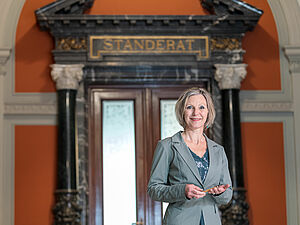"A national organic action plan would be extremely beneficial for Switzerland"
50th anniversary voices
Maya Graf is a politician, social worker and co-owner of her family's organic farm in Sissach in the canton of Baselland. In 2001, she moved into the Swiss National Council for the Green Party and has been a member of the Council of States since 2019.
Ms Graf, what sparked your interest in organic farming?
I grew up on a farm, where I still live today and of which I am a co-owner. In the eighties, the forest dieback and the ecological movement inspired me to get more involved in politics. Since then it has been clear to me: our agriculture must work with nature, not against it. We converted our farm to organic in 2000. When I entered the national parliament in 2001, I became president of what is now the Swiss Alliance against genetic modification (Schweizer Allianz Gentechfrei SAG).
How did you get to know FiBL?
Back in the early days, while it was still in Oberwil in our canton. My brother worked at FiBL.
As a member of the National Council and Council of States you have so far submitted over 120 motions relating to agriculture. Many of them also concerned FiBL. Why is that?
FiBL offers applied research and works closely with local farming families. At the same time, it is a world leader in scientific research and development in the grand scheme of areas such as climate, biodiversity and agroecology. The systemic approach to organic agriculture and FiBL's research are more in demand and important than ever for the transformation of our food system.
Have you ever disagreed with FiBL?
It is important and normal that there are differing opinions at a research institute. FiBL is independent, just like the ETH Zurich or a university. FiBL’s research covers the entire food system, a prerequisite for a sustainable, ecological and climate-friendly value chain. It is important that such wide-ranging issues develop different approaches to solutions. Former FiBL director, Urs Niggli, for example, is flirting with the use of genetic engineering in organic farming. Of course, he should be allowed to have his opinion. But just as naturally, one should also be able to contradict him with good arguments. (laughs)
You have been a strong advocate of solid financing for FiBL. How exactly?
That was only possible thanks to a broad political alliance. It took cross-party coalitions in parliament and the support of associations such as the Farmers' Union. The reason was two motions that wanted to make Agroscope and FiBL equal partners. The Federal Council rejected these motions, but Parliament recognised the need for more research in organic farming and included additional funding in the 2020 budget. This resulted in a grant agreement with the Federal Office for Agriculture for basic funding of 15 million Swiss Francs per year for four years.
Have you benefited from FiBL's research results for your own politics?
Yes, for example, concerning plant breeding; one of my postulates resulted in the "Swiss Plant Breeding Strategy", in which Monika Messmer, head of the plant breeding group at FiBL, played a major role with her extensive know-how. The strategy also aims to strengthen private organic seed breeders in Switzerland. In general, I am often very happy to receive research results from Frick, which give my work the necessary background.
Switzerland has no organic target, such as the EU wanting to achieve 25 percent organic area by 2030. The agricultural policy AP 22+ never specifically mentions organic farming, only sustainability and agroecology in general. Why?
In principle, the federal government has recognised the concept of agroecology and has also tried to implement it from the agricultural policy AP 14+ onwards. What is missing, however, is a strategy for the future. A national organic action plan would be extremely beneficial for Switzerland in relation to the entire agricultural and food sector. In Switzerland, however, we have a powerful food industry linked to the centre-right politics and the Farmers' Union. This lobby has always prevented an strong advancement of organic. At least there are now action plans for more organic farming in various cantons.
You are also committed to the equality of women in agriculture, an issue for decades, which is hard to understand. Why is it taken so long?
For a long time, I have been working with the Swiss association for women farmers and rural women through the women's umbrella organisation Alliance F. We want women to have social security on farms where they are not co-owners or self-employed. You can see that a new generation of women farmers is finally coming forward and demanding this. But overall, we see that very traditional role models are still firmly engraved in agriculture.
What will FiBL’s situation be at its 75th anniversary? What will be its legacy?
The Institute will continue to play an immensely important role in the future. The climate and biodiversity crises are progressing rapidly. Holistic thinking and acting are more in demand than ever for the agricultural and food sector. For a good thirty years, I have been fighting against linear thinking and against the destruction of our natural resources for short-term profit. Our resources are finite, so we need systemic approaches, like the ones FiBL researches every day and makes available worldwide. The Institute not only generates the foundations for transformation, but also develops the necessary "best practice" by transferring its knowledge to farms. We need many different sustainable solutions, and we need them very soon.
Interview: Beat Grossrieder
This is a shortened and slightly adapted version of an interview that appeared in issue 6/23 of the Bioaktuell magazine. It is available as a PDF.
Further information
Link
- orgprints.org: Interview in the Bioaktuell magazine (in German)
- orgprints.org: Interview in the Bioaktuell magazine (in French)
- orgprints.org: Interview in the Bioaktuell magazine (in Italian)




